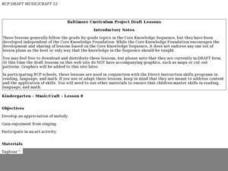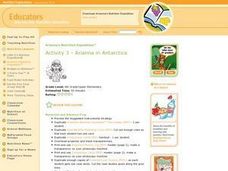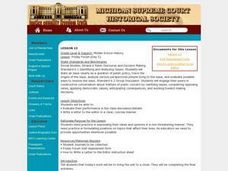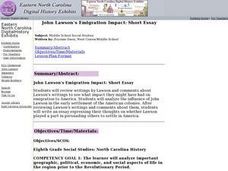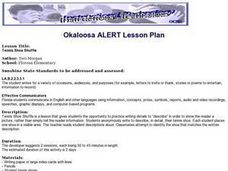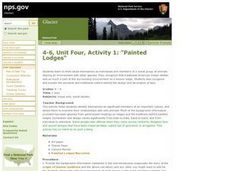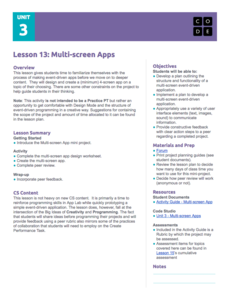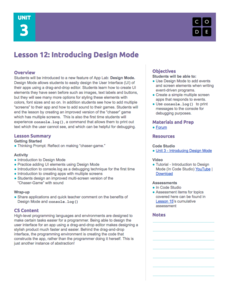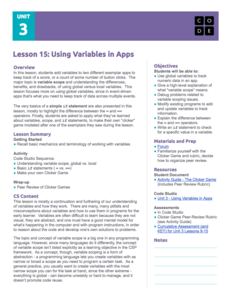Curated OER
Measurement
First graders participate in various activities dealing with measurement, length, volume, and temperature. They identify the need for standard units of measure, sort and classify objects, measure distances, and use a thermometer.
Curated OER
Music/Craft
Students develop an appreciation of melody. They gain enjoyment from singing. They participate in an art activity.
Curated OER
Arianna in Antarctica
Fourth graders review their knowledge of the food groups and their benefits. They make comparison flash cards with different foods and their benefits, sharing them in creative ways. Finally, they work in groups to solved case studies...
Curated OER
The Importance of the Past
Young scholars, in groups, study why the past is important by sharing personal past experiences. They discuss why all human pasts are important, as well as the importance of their local or family history.
Curated OER
Social Studies: When in Rome...
Pupils conduct Internet research on selected countries. They simulate a business trip requiring airplane flights, car rentals, and hotel reservations. They present their virtual trips in written reports after sharing their findings in...
Curated OER
Poetry and Growth
Students participate in reading various poems in order to complete different activities. In groups, they compare and contrast the writing style and subject matter of two different author's poems. They practice writing poems on...
Curated OER
Friday Forum (Day 5)
Young scholars evaluate their performance in different debates about the laws of Michigan. They write a letter to an editor of a newspaper sharing their opinions. They write journal entries as well.
Curated OER
Good Enough To Eat
Students are introduced to the five food groups. In groups, they place different foods into the correct section of the Food Pyramid. Using different types of technology, they create one page of a class ABC book sharing what they know...
Curated OER
John Lawson's Emigration Impact: Short Essay
Students review John Lawson's writings to discover the impact they had on emigration to America. Using the writings, they analyze the influence of them and review the early settlement of the colonies. They write their own essay sharing...
Curated OER
Shakespear Scavenger Hunt
Students use the internet to study basic biographical facts about Shakespeare in the form of an internet scavenger hunt. This activity is a great introduction to a Shakespearean unit of study.
Curated OER
Civil War Letter Web
Students use the internet to gather information on a specific Civil War battle of interest to them. Using the information they gather, they organize it into a web to be used later when writing a letter. They use the web to write their...
Curated OER
Nancy's Nice Nose
Students recognize the phoneme /n/. Through matching activities, students discriminate the phoneme /n/ from similar looking letters and phonemes. They associate the phoneme /n/ with its letter representation and identify the phoneme /n/...
Curated OER
Presentations
Students use the Internet and word processing programs to complete their research for their presentations. In groups, they participate in hands-on activities that incorporate into a drawing project. They share cultural and geographical...
Curated OER
Shoe Shuffle
Learners review the "word choice" writing trait, and recall how to use descriptive words to paint a picture. They write a description of one of their tennis shoes without sharing it with classmates. They place a shoe on display while the...
Curated OER
Communicate with a Truck Driver
Sixth graders complete activities to learn about the trucking industry. In this truck driving lesson plan, 6th graders explore websites for positive trucker images and learn about their contributions to society. Students communicate with...
Code.org
Events Unplugged
Introduce event-driven programming. Young computer scientists learn the meaning of event-driven programming and how it is different from previous styles of programming. They play a card game to simulate the challenges that occur in this...
Curated OER
Painted Lodges
Students explore lodge construction as a representation of culture. In this cultural diversity and Native American history lesson, students listen to a narrative explaining the origin of Native American painted lodges. Students design...
Concord Consortium
Intermolecular Attractions and Boiling Point
Why do different substances have different boiling points? Through an interactive lesson, learners explore how intermolecular attractions affect boiling points. They interact with molecules through an animation and make conclusions about...
Curated OER
Narrow It Down
Ever played 20 Questions? A similar game helps young learners practice asking and answering yes-or-no questions. Spread out several objects, preferably all similar with slight variations (buttons or coins would work well). A leader...
Code.org
Multi-screen Apps
Scholars continue their study of event-driven programming by creating a multi-screen app in the fifth lesson of the series. They incorporate previously learned elements and events in the mini-project.
Code.org
Controlling Memory with Variables
Not all variables are created equal. Discover how variables in computer science are different from variables in math class. Scholars learn to work with variables in computer programming by developing a mental model for how variables...
Code.org
Practice PT – Improve Your App
The last installment of a 21-part unit is a practice performance task that asks class members to design an app using skills from the unit. Scholars take one of the previous apps from the unit and modify it by adding elements and making...
Code.org
Introducing Design Mode
Move beyond buttons when designing user interfaces. In the fourth installment of a 21-part unit, young computer scientists learn to apply design mode, which gives users options for colors, fonts, etc. They learn to incorporate these...
Code.org
Using Variables in Apps
Investigate the benefits of using global variables. The seventh installment of a 21-part unit continues the study of variables from the previous lesson. Young computer scientists modify two existing apps by adding variables and learn how...



